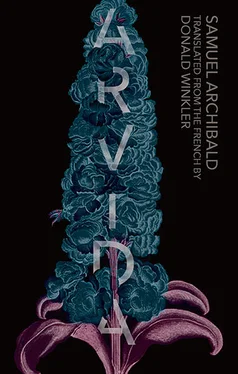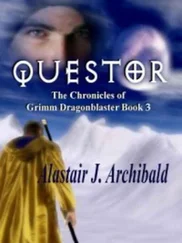Archibald Samuel - Arvida
Здесь есть возможность читать онлайн «Archibald Samuel - Arvida» весь текст электронной книги совершенно бесплатно (целиком полную версию без сокращений). В некоторых случаях можно слушать аудио, скачать через торрент в формате fb2 и присутствует краткое содержание. Год выпуска: 2015, Издательство: Biblioasis, Жанр: Современная проза, на английском языке. Описание произведения, (предисловие) а так же отзывы посетителей доступны на портале библиотеки ЛибКат.
- Название:Arvida
- Автор:
- Издательство:Biblioasis
- Жанр:
- Год:2015
- ISBN:нет данных
- Рейтинг книги:3 / 5. Голосов: 1
-
Избранное:Добавить в избранное
- Отзывы:
-
Ваша оценка:
- 60
- 1
- 2
- 3
- 4
- 5
Arvida: краткое содержание, описание и аннотация
Предлагаем к чтению аннотацию, описание, краткое содержание или предисловие (зависит от того, что написал сам автор книги «Arvida»). Если вы не нашли необходимую информацию о книге — напишите в комментариях, мы постараемся отыскать её.
, with its stories of innocent young girls and wild beasts, attempted murder and ritual mutilation, haunted houses and road trips heading nowhere, is unforgettable. Like a Proust-obsessed Cormac McCarthy, Samuel Archibald's portrait of his hometown, a model town design by American industrialist Arthur Vining Davis, does for Quebec's North what William Faulkner did for the South, and heralds an important new voice in world literature.
Samuel Archibald
Arvida — читать онлайн бесплатно полную книгу (весь текст) целиком
Ниже представлен текст книги, разбитый по страницам. Система сохранения места последней прочитанной страницы, позволяет с удобством читать онлайн бесплатно книгу «Arvida», без необходимости каждый раз заново искать на чём Вы остановились. Поставьте закладку, и сможете в любой момент перейти на страницу, на которой закончили чтение.
Интервал:
Закладка:
It was he, Menaud, who planned the trips. When he was fifteen, working on his father’s farm, he’d decided to see the entire world. At eighteen he realized that he was subject to seasickness and afraid of flying. All he had left was America, if he wanted to satisfy his desire to see a world beyond the wide but constricted horizon of his agricultural land. The worst part was that he didn’t even like to drive. He was the one who’d decided we’d take the Cabot Trail, and he’d decided we’d do it at night, and now he was snoring beside me with a bottle of Dow between his legs. He’d said:
“Seems you gotta see that.”
I wondered what on earth he could see, spread-eagled on his seat with an arm across his face. Even with my eyes open, I could see almost nothing. A few feet of wet pavement in front of the headlights, and the pounding rain. The road was all ups and downs, in bends and twists, no more than an inch or two from the precipice. For most of the way I’d been driving by instinct, like blind creatures living in grottos and attics, sensing rather than seeing the forms things took in the rain.
I was half hypnotized when I saw her. She was standing by the side of the road wearing a short red coat, unfastened, over a big white dress. I barely saw her face, veiled by her black hair, very long, tossing in the wind. I was so numb that I kept going for a hundred more feet at least before putting on the brakes. It must have been pretty sudden, because Menaud woke up. He took a slug of beer.
“What’s happening?”
“There’s a girl back there, beside the road.”
He turned his head, without really looking.
“You crazy?”
I sniffed, lit a cigarette, and opened my door. I said to Menaud:
“Wait here.”
“I’m not waiting outside, that’s for sure.”
By the time I took three steps my clothes were soaked and my cigarette was out. I threw it onto the shoulder. The slope was steep enough that I had to brace my legs. I walked and walked, a lot farther than the spot where I’d seen the girl. And I didn’t find her. I went back along the cliff, peering down at the rocks and the sea, two hundred feet below. I couldn’t see much, and my clothes were now wet through. At one point I stopped and looked carefully, trying to pick out a form in the water or on the rocks. There was nothing, but I waited for a long time. The clouds were swollen with water, like the plastic sheets you hang up over drying wood, and they were full of electricity, too. I couldn’t see well. I was dazzled by the lightning and blinded by its absence. I heard a din that was more like thunder than surf, I saw the waves crashing and exploding against the rocks in a commotion that had nothing gentle or harmonious about it, I saw the ocean like an immense black mass streaked with foam, and I understood that every time I’d seen the sea before that night, on the bridge of a ferry, at the lighthouse at Pointe-au-Père, or on the beach at Cape Cod, I’d seen a postcard, I’d seen a lie.
I went back to the car, running through the heavy rain. Menaud didn’t ask me any questions and that suited me fine, because I wouldn’t have known what to reply. By the time I’d calmed down and we were on our way, he’d gone back to sleep.
About four in the morning, I left the Cabot Trail for the 105, crossed from Cape Breton to mainland Nova Scotia through the Canso Canal and drove for a while on the 104.
A little after 4:30, I shook the dead weight next to me, and said:
“Menaud, we’re here.”
He stretched, on the seat.
“This is Antigonish?”
“So it would seem.”
The town glimmered in the darkness like any other town. We couldn’t make out the city hall on Main Street, or St. Martha’s Hospital, or the campus of St. Francis Xavier University. Just the rooftops, the elevated silhouettes of a few buildings, and a good hundred dim lights beneath a pale grey sky. Menaud took out his notebook and made a cross in it.
“The Cabot Trail, check.”
“You slept all the way, Menaud.”
I took a mouthful of beer, which by then was as fresh as piss in an iron pail.
“Which means what?”
“That technically, you didn’t see the Cabot Trail.”
“I’ve just done three hundred miles on it.”
I let that go. The week before, we’d passed the site of one of the oldest abandoned mines in eastern Canada. I’d never worked in a mine, but my father was a miner, and already in 1969 I’d seen in his eyes, on his clothes, and in his body, his bent back and his stiff neck, enough of mines to do me for a lifetime. Chopping down trees wasn’t any less hard, but at least you were outside. I’d taken advantage of the fact that Menaud was sleeping to drive right past. When he woke up, he’d said:
“Are we getting near the mine?”
“The mine? We passed it an hour ago. You were sleeping like a log. Anyway, that would have put us behind schedule.”
“We’re going back.”
“What?”
“We’re going back.”
“I just told you we passed it an hour ago.”
“We’re going back.”
“For God’s sake, Menaud. We’ll get there in the dark.”
“We’re going back.”
There was no point trying to reason with him. We went back. The mine was like a series of crude stairways carved into a meteorite crater. He looked at it for about ten seconds before making a cross in his notebook. That’s how Menaud travelled.
We found ourselves a hotel, but I didn’t sleep for long. In the morning we visited the town on foot. After, we stopped to eat. In all my life, I’ve never seen anything so disgusting as Menaud’s breakfasts. He put ketchup on his eggs and mustard on his toast. He poured syrup on his bacon, and when he found an accommodating waitress, he added a fried onion on top of all that.
I was going to leave for Cape Breton in the afternoon, aiming for the other side of the island, to visit Louisbourg. In ’61, archaeologists, historians and architects had begun the reconstruction of an old French fortress that had been destroyed by the English in 1759. I really wanted to see that, but Menaud didn’t want to have anything to do with it. He’d decided to stay in Antigonish while I was there. I’d have to come back and pick him up, and return to Quebec via New Brunswick. It wouldn’t be a big detour to go back through Antigonish, unless Menaud ended up drunk in some ugly duckling’s sheets, and made me search for him all over town. I’d have preferred to keep him with me.
“You’re sure you don’t want to come?”
“Forget it. No way I’m going another hundred miles just to see some pencil pushers digging a town out of the mud.”
He always talked that way. I worked to pay for my education, he worked because beer doesn’t come out of the water tap. Travelling through time and space both was just a bit too much for him. That was about it.
“You shouldn’t talk that way, Menaud. Seems to me you were born in the mud too, like tadpoles or couch grass, and you crawled up to your parents’ farm. Your mother adopted you because she thought you looked pathetic with your little girl’s legs and your monkey’s ears. She was never very particular about men in any case.”
I know plenty of people who would have punched me in the face for less than that, but not Menaud. He liked playing the tough guy, he liked to say he’d been in prison, and he was the only man I’d ever met who you could flatter by saying his father had been a thief and his mother a whore.
He gave me a big smile with his rotten teeth.
“Yeah, maybe that’s what happened.”
I took off on my own. I wasn’t afraid. In those days people told all kinds of stories about drivers picking up white-faced hitchhikers who vanished without a trace right in the middle of a trip. No one had ever told me about a woman in a red coat haunting the Cabot Trail, and anyway mine wasn’t even thumbing a ride. She was just there, looking out over the high seas with her dry hair, as if our nights were her days, as if she saw, in the midst of the storm, an enormous sun shining over the strait. Of course, I know I didn’t see a ghost on the road that night. I may be old now, but I’m not crazy. Except it’s remained a mystery to me, not knowing who put that woman in my head, who’d given her that silhouette and that face that I’d never seen anywhere. There’s something unknowable in all that, like how you can never really tell if it’s the water, the wind, or the salt adrift in the wind that carves animal shapes and women’s faces out of the fjords.
Читать дальшеИнтервал:
Закладка:
Похожие книги на «Arvida»
Представляем Вашему вниманию похожие книги на «Arvida» списком для выбора. Мы отобрали схожую по названию и смыслу литературу в надежде предоставить читателям больше вариантов отыскать новые, интересные, ещё непрочитанные произведения.
Обсуждение, отзывы о книге «Arvida» и просто собственные мнения читателей. Оставьте ваши комментарии, напишите, что Вы думаете о произведении, его смысле или главных героях. Укажите что конкретно понравилось, а что нет, и почему Вы так считаете.












